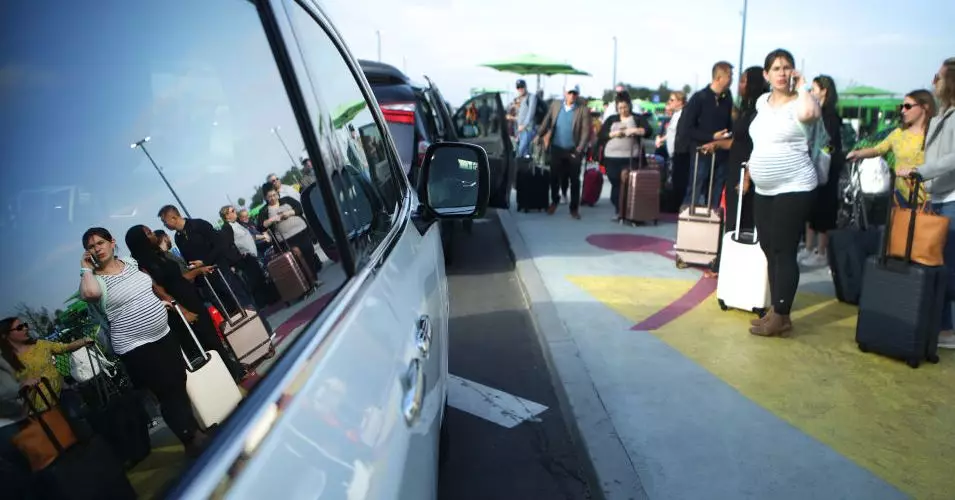In the tech-centric narrative of Silicon Valley, the term “disruptive innovation” has become a staple, often heralding the promise of new solutions to age-old problems. However, as history has shown, many of these innovations simply recycle existing concepts under the guise of something new. The latest contender in this ongoing saga is Uber’s Route Share, which has stirred a cauldron of debate about its effectiveness and the sincerity of its environmental claims. Positioned as a modern-day answer to public transportation woes, this initiative raises questions about its genuine impact on urban transit, air quality, and community accountability.
As Uber reinvents the bus, the echoes of similar ventures in the past invite scrutiny. Companies like Lyft and even Elon Musk with his ambitious yet unfulfilled urban loop concept have previously dabbled in what can essentially be labeled as shuttle services. Yet, one must ask: is Uber truly innovating, or merely dressing up an age-old concept for a new audience? The vocabulary used by Uber executives during the introduction of Route Share—strikingly absent of terms like “bus”—suggests an attempt to sidestep the stigma associated with traditional public transit, which is often viewed as less glamorous in comparison to ride-hailing services.
Concerns Over Environmental Impact
While Route Share seeks to capitalize on the shared nature of commuting, critiques abound regarding its environmental efficacy. The Union of Concerned Scientists has previously documented the stark reality that rideshare services, on average, contribute significantly more carbon emissions than the trips they replace. A staggering 40 percent of the mileage racked up by rideshare drivers occurs during periods where they are without passengers, a phenomenon dubbed “deadheading.” In an age where climate consciousness is paramount, it’s disheartening to see services that promise convenience adding more vehicles to an already congested landscape.
Kevin Shen, a researcher at the Union of Concerned Scientists, highlights a crucial fear: Uber’s attempt to “reinvent the bus” might very well produce a “worse bus.” As public discourse shifts toward sustainability and conscious commuting, Uber’s Route Share could infuse additional contradictions into the narrative of greener urban transport. Will pooling options, while slightly better in reducing emissions, genuinely encourage a significant transition away from individual car ownership without leading to a broader deterioration of public transit systems?
The Disparity of Accountability
At its core, the proposition that Uber can effectively deliver public transportation reveals a troubling facet of accountability. Unlike public transit agencies, which operate under regulatory oversight and community input, companies like Uber function with a profit-driven agenda. Transit systems aim to serve a diverse array of communities, providing access to essential services for all socioeconomic groups without the ultimate goal of profitability. In contrast, the autonomous nature of Uber and corporations like it invites skepticism over their commitment to community welfare when the bottom line is at stake.
The absence of transparency in where and how these services operate generates an ethical dilemma. Questions inevitably surface about who benefits from Uber’s Route Share—is it merely a service for those who can afford it, or does it extend its reach to underprivileged communities often left behind by traditional transit systems? Shen’s critique underscores the risk of a shift toward privatized public transportation models devoid of the accountability measures that the public sector inherently upholds.
The Path Ahead: Collaboration or Competition?
As the landscape of urban transportation continues to evolve, one must ponder whether collaboration between tech companies and existing transit systems could yield superior outcomes for everyone involved. The dance between innovation and established public services is fraught with tension, yet it also presents exciting possibilities for advancement. Instead of vying against each other, a partnership could enhance service quality, accessibility, and sustainability.
In a time characterized by pressing environmental challenges and urban congestion, true progress doesn’t lie in redefining existing solutions but rather in collectively advocating for transit models that prioritize people and the planet alike. Only through genuine cooperation can we create a transportation ecosystem that is equitable, efficient, and aligned with the values of the communities it serves. Thus, Uber’s Route Share could serve as a litmus test for the future of urban transit: will it advance our collective agenda, or will it merely restate past mistakes under a veneer of novelty?

